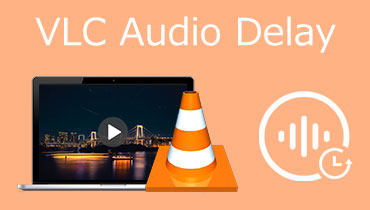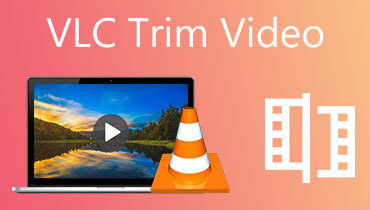All You Need to Know About VLC Media Player Subtitles
VLC is a highly popular and widely used media player known for handling various media formats. One of its outstanding features is its support for subtitles, which provide textual representation of dialogues. In this post, you will learn everything about VLC Media Player subtitles' functionality. We’ll cover how to load, manage, and customize subtitles to better understand and enjoy your content. If you want to know how it works, keep reading!

PAGE CONTENT
Part 1. What is VLC
Before getting into the specifics, let us first introduce VLC. Short for VideoLAN Client, VLC Media Player is a highly popular open-source multimedia player. It is renowned for its versatility in playing various media, including digital files and optical disc drives. But what makes it truly notable is the addition and customization of subtitles. This additional feature enhances the viewing experience of users by including or modifying subtitles. What’s more, VLC is accessible across different devices, including Windows, Mac, Linux, and smartphones. That said, VLC further solidifies its status as a highly versatile media player.
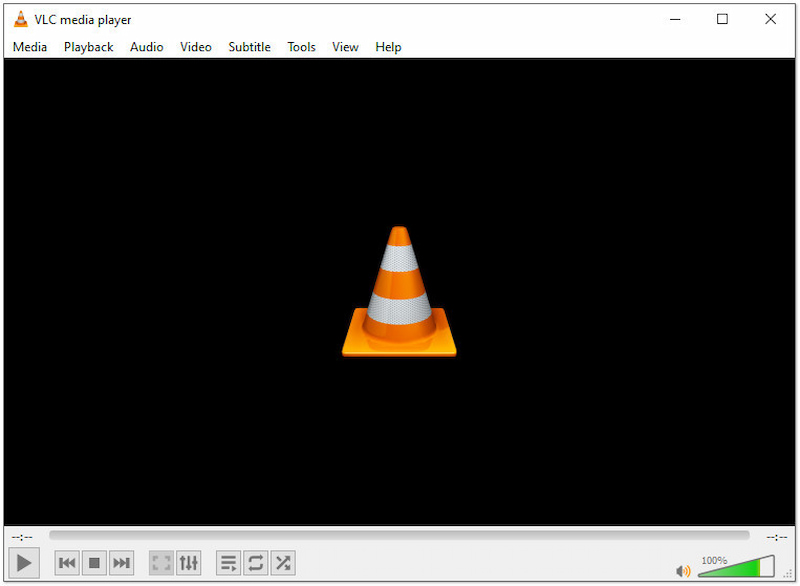
Part 2. Add Subtitles to the Video in VLC
As mentioned, you can add subtitles to video in VLC to enhance your viewing experience. You can add subtitles in formats like .sub, .srt, or .ssa and incorporate them into the media playback. This feature is useful for watching TV shows and films in different languages.
Step 1. Access the Media tab and click Open File to add the video for playback.
Step 2. Once the video is playing, move to Subtitle and select Add Subtitle File.
Step 3. Locate the subtitle file on your drive and click it to add it to the media player.
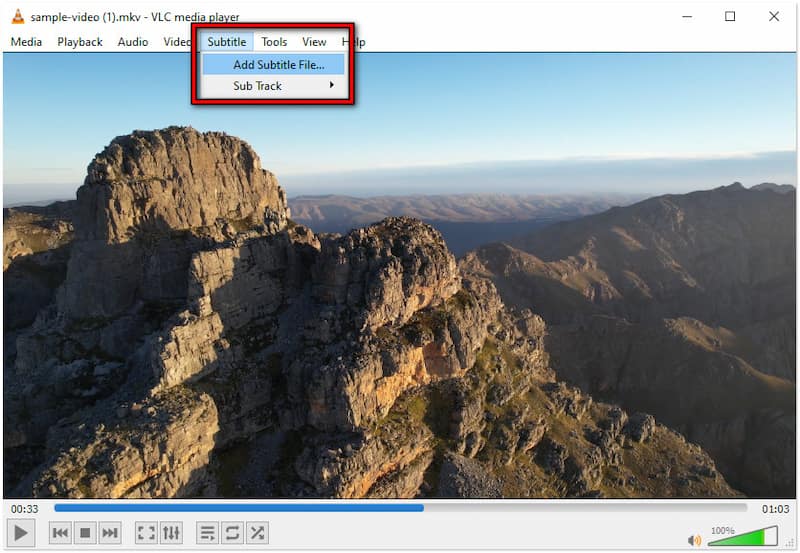
Subtitles add convenience and provide an enjoyable viewing experience. But not all videos have subtitles in every language.
Part 3. Adjust Subtitle Timing in VLC
After you add subtitles to video, you may find subtitles not aligned with the dialog, causing delays or mismatches. Fortunately, you can adjust subtitle timing in VLC using built-in tools. This is essential to correct the discrepancies and maintain a smooth viewing experience.
Method 1: Subtitle Delay in VLC
Step 1. Look for the Track Synchronization option in VLC’s Tools tab.
Step 2. In Subtitle Track Synchronization, enter the delay time for the subtitles.
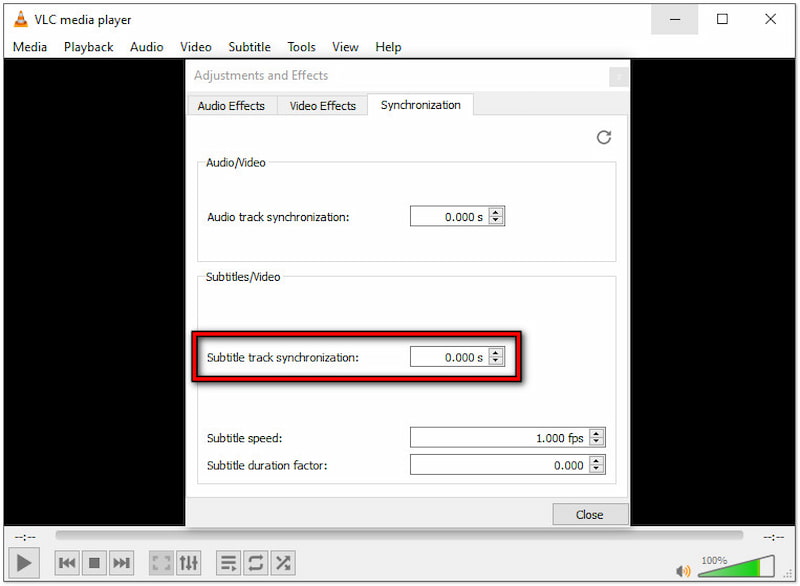
Method 2: Sync Subtitles in VLC
Step 1. Start the video playback in the VLC Media Player.
Step 2. Press Shift + H to sync the subtitle timing.

Both methods provide an efficient solution to correct subtitle timing issues. Now, a small heads-up. Continuous adjustments through keyboard shortcuts can lead to over-correction.
Part 4. Disable Subtitles in VLC
At times, you might prefer to watch a video without subtitles to avoid distraction. For good measure, VLC Media Player allows you to turn off subtitles during playback. This approach is useful when you want to enjoy the video without additional text.
Step 1. Start playing the video from which you want to remove the subtitles.
Step 2. While the video is playing, press V to disable the subtitle track.

VLC subtitle shortcut provides an easy-shopping solution to control the display of subtitles. However, you may struggle to understand dialogue, especially if the accents are difficult to understand or the speakers talk quickly.
Part 5. What to do When the VLC Subtitle Not Showing
Check Subtitle File Compatibility
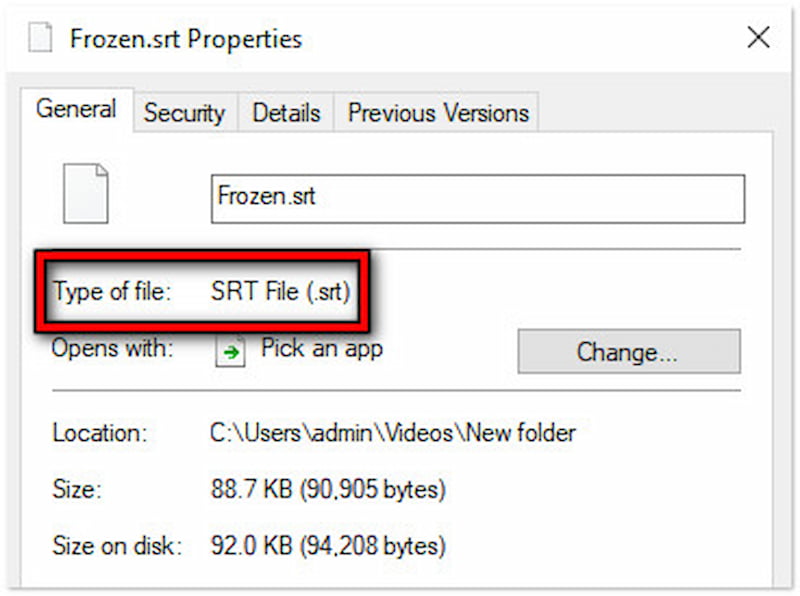
The common reason subtitles are not displayed is a corrupted subtitle file. Although VLC can handle various subtitle formats, it will not load a file that is damaged or encoded improperly. You can avoid these issues by ensuring your subtitle files are in a supported format and not corrupted. Try to download subtitles from trusted sources and ensure they are in a compatible format. In addition, check the file’s encoding to prevent subtitles from displaying incorrectly.
Ensure Subtitles Are Enabled
Sometimes, subtitles are missing simply because they are not enabled in settings. Ensure that the Sub Track option is not disabled. Sometimes, subtitles might be turned off or not set as the default track. This simple approach can resolve the VLC subtitles not showing issues.
Step 1. Navigate to the Subtitle menu in VLC’s top bar menu.
Step 2. Select the Sub Track option and ensure Disable is not selected.
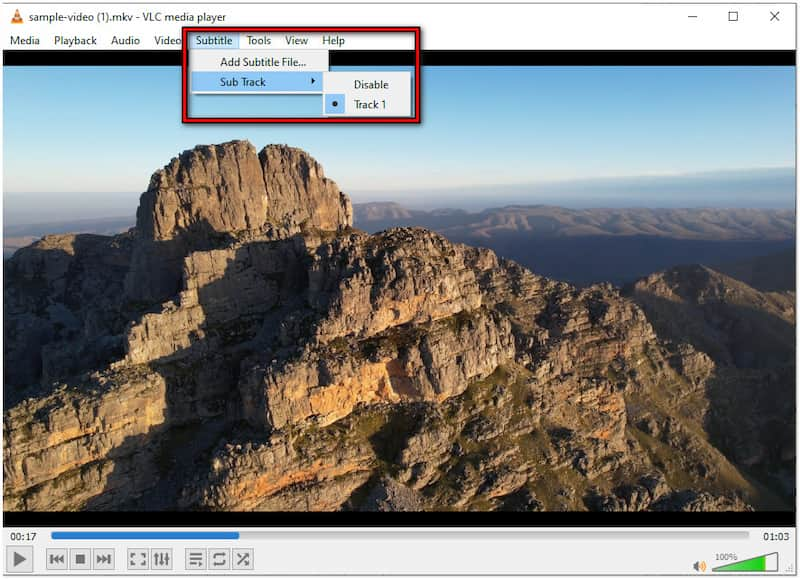
Tip: If you have multiple tracks, select the appropriate subtitle track.
Adjust Subtitle Settings
One of VLC’s lesser-known features is the customization of the subtitles display. This includes subtitles’ position, font style, size, thickness, and color. If these settings are configured incorrectly, subtitles might be rendered unreadable.
Step 1. In VLC’s Simple Preferences settings, switch to the Subtitles/OSD tab.
Step 2. Configure the subtitles’ position, default encoding, and subtitle effects.

Tip: Ensure the subtitles are not positioned off-screen. Also, resetting these settings to default can help resolve display issues.
Part 6. Best Alternative to VLC to Add Subtitles to Video
Although VLC supports several subtitles, less-known formats are incompatible with the media player. Fortunately, Vidmore Video Converter offers broader support for less-known and newer subtitle formats like SRT, SSA, ASS, UTF, etc. In addition, it comes with advanced subtitle management features that go beyond what VLC provides. This versatile tool lets you style your subtitle by changing the font format, color, size, outline, and position.
Moreover, you can bold, italicize, and even underline important text from your subtitle. But what makes it truly worthy is the adjustment of opacity and subtitle delay functionality. By adjusting the opacity, you can make subtitles more readable and ensure visibility with various backgrounds. Meanwhile, the Delay feature allows you to align subtitles with the dialogue in real-time, making it easier to understand the context of the video.
Here’s how to add subtitles to video in VLC alternative:
Step 1. Initially, get the free download of Vidmore Video Converter. Install the multimedia software and wait for the installation process to complete.
Step 2. Once the installation is complete, launch it on your computer. In the Converter tab, click + Add Files to add the video from which you want to add the subtitles.

Step 3. After loading the video, move to the Subtitle Disabled and select + Add Subtitle. Once the subtitle is added, click Edit Now from the popup window to bring up the editor.

Step 4. In the Subtitle Editor, configure the subtitles' appearance according to your preference. Choose your preferred style, color, and size, and select the subtitle position if needed.
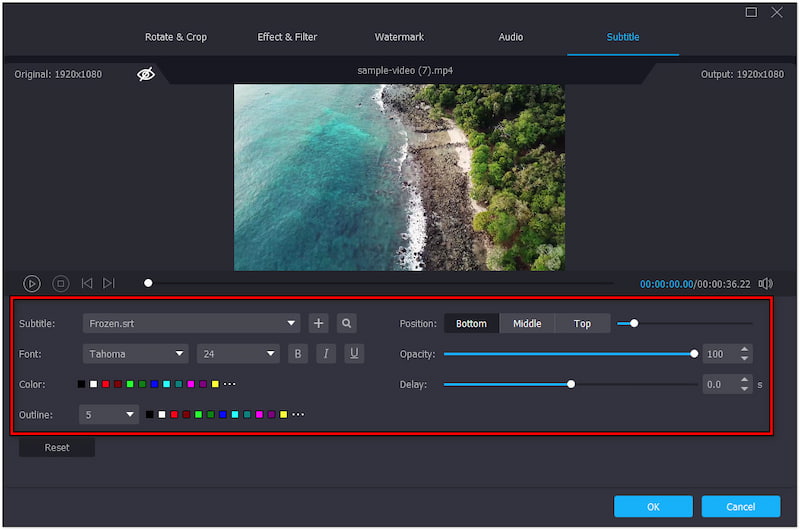
Step 5. In addition to the previous customization, you can adjust the Opacity and Delay sliders to ensure they are well-synchronized with the video.
Step 6. Once done with the customization, click OK to apply the changes. Before saving the final video, choose the desired format. Finally, click Convert All to obtain the video.
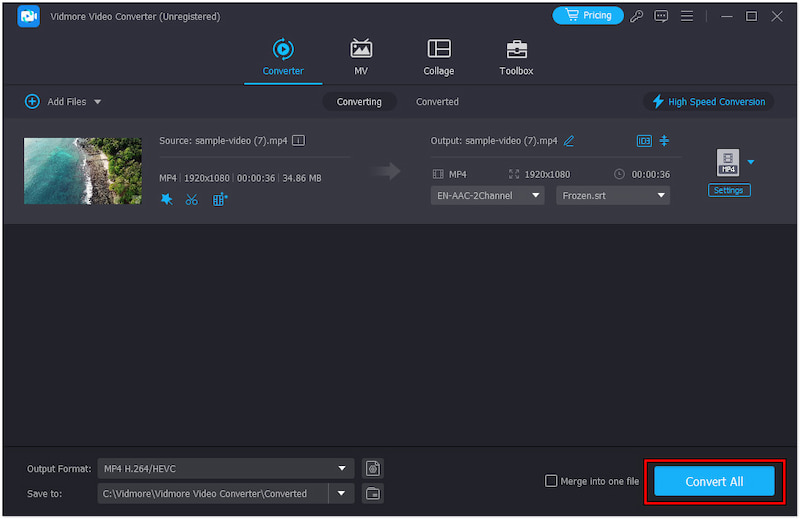
Vidmore Video Converter stands out as a valuable VLC media player alternative. It allows you to add subtitles and customize them according to your liking. If you don't have a subtitle file saved on your computer, worry not! You can use the Magnifying Glass icon within the Subtitle Editor to search for a subtitle for your video online.
Part 7. FAQs about VLC Media Player Subtitles
Can VLC generate subtitles?
No, VLC cannot generate subtitles. It only allows you to manage and display subtitles, but it cannot generate subtitles from video content.
How do I get subtitles from a video in VLC?
If you want to get subtitles for a video, you can use the VLsub in the View tab. Click the Search by Name option to search for the subtitles. Select the appropriate subtitles and click Download Selection to load the subtitles to your video.
Can you use SRT in VLC?
Yes, SRT files are one of the many subtitle formats supported by VLC. This file is a common subtitle format that contains plain text with timestamp information.
Conclusion
In conclusion, the VLC Media Player subtitles feature significantly enhances your viewing experience. It offers flexible options to integrate and manage the subtitles. If you need to add subtitle files, adjust timing, or delay their appearance, VLC provides an easy-going solution to achieve this. On the other hand, Vidmore Video Converter can be an alternative solution for handling less-known and newer subtitle files. What’s more, it allows you to customize your subtitles for more visually appealing results.

